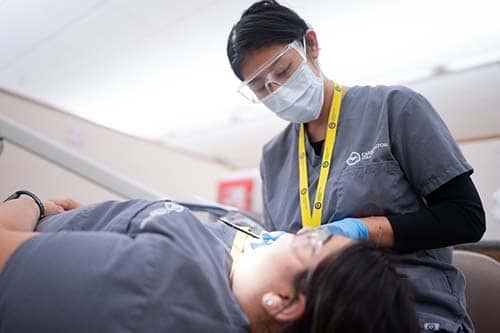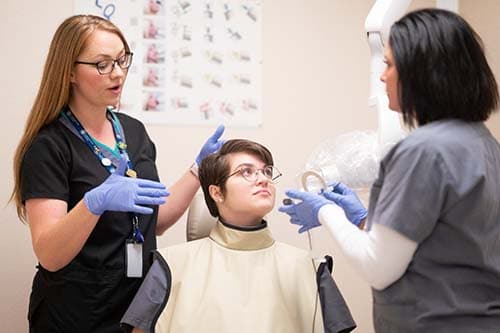The dental industry is on the rise. Between 2016 and 2026, the Bureau of Labor Statistics (BLS) predicts that the demand for dental hygienists in the United States will have increased by an impressive 20%1. Yet this high demand is far from the only reason to consider a career as a dental hygienist. Dental hygienist was recently ranked #2 on the list of Best Health Care Support Jobs by U.S. News & World Report2. Becoming a dental hygienist is an attractive choice for many reasons, from competitive salaries and flexible schedules to the satisfaction that comes from doing hands-on work that helps people live healthier lives.
What Does a Dental Hygienist Do?
Compared to both dental assistants and dentists, dental hygienists have the highest amount of one-on-one interaction with patients. In their daily work, dental hygienists provide a wide variety of preventative dental care, including3:
- Removing stains, tartar, and plaque from teeth
- Protecting teeth using fluoride and sealants
- Examining patients for oral diseases or abnormalities
- Taking and developing oral X-rays
- Informing dentists of potential issues and areas of concern
Dental hygienists also have the important job of educating patients on proper oral hygiene and care. They explain topics like flossing techniques, how to select toothbrushes, and the link between diet and oral health.

Top 12 Reasons You Should Become a Dental Hygienist
1. Enjoy a Flexible Work Schedule
No matter what type of work schedule you want, you likely can find it as a dental hygienist. Dental hygienists can work in full- or part-time roles, and many hygienists work only a few days a week4. You could even work in a floating position, where you work at multiple offices throughout the week. In this career, you often can customize your schedule to fit your personal needs and maintain a healthy work-life balance.
2. Earn a Competitive Salary
How much do dental hygienists make? This question is among the most common to ask about any career you’re considering. Luckily for you, dental hygienists usually earn more than the average for health technologists and technicians. In fact, in the United States, the median dental hygienist salary is $74,820 per year, or almost $36 an hour5. Your actual salary will depend on things like where you live and how much experience you have, but the national median gives you a good idea of the competitive salary dental hygienists can earn.
3. Pursue an In-Demand Role
The demand for dental hygienists is growing fast. As the population ages and people retain more of their original teeth than past generations, increasing dental care is needed. A better awareness of the importance of preventative dental care is also driving demand for dental services. According to the BLS, demand for dental hygienists will be especially high in rural areas where access to dental care is limited6.
4. Take the Fast Track from Student to Professional
Becoming a dentist takes years of training and multiple degrees, but becoming a dental hygienist usually only requires earning an associate’s degree. Many dental hygienist associate programs can be completed in fewer than two years. With the competitive salaries earned in this field, investing in your education and pursuing a dental hygienist degree could pay off quickly.
5. Work in a Relaxed and Interactive Environment
Dentists strive to create a calm and inviting atmosphere for patients. These efforts typically also make dental offices a comfortable and enjoyable place to work. As a dental hygienist working in this kind of environment, you’ll get to interact with people of varying ages and backgrounds every day, help to ease any fears and ensure their visits go smoothly. Over time, you can even build relationships with your repeat patients.
6. Help Others Improve Their Health
The value of oral hygiene goes far beyond a nice smile. According to the Mayo Clinic7, poor oral health can lead to serious diseases and issues with your overall health—including cardiovascular disease, pregnancy complications, and more. Dental hygienists have a direct impact on helping patients not only feel better about their smiles and oral health, but also live healthier lives.
7. Do Hands-On Work
Many careers require people to spend all day stuck behind a desk, staring at a computer screen. This is not true for dental hygienists. In this career, you’ll always be up and moving around the office, interacting with both co-workers and patients. As a dental hygienist, you can enjoy the satisfaction that comes from using your hands as well as your mind.
8. Every Day is Different
Dental hygienists work with numerous patients each day. Even when you are completing similar tasks, each patient will have unique needs, concerns, and challenges. Every patient will involve different interactions, oral care, and dental health education, and you’ll need to be ready to adjust your communication style and methods for each patient. No two days will be exactly alike, and you never know what the day ahead might bring!
9. Receive Potential Benefits from Your Employer
Dental hygienists may receive a range of benefits through their employers, including paid vacations, sick leave, insurance coverage, dues for professional memberships, and tuition support for continued education. The extent of your benefits often depends on your employer, and whether you are a full-time or part-time employee.
10. Find Job Stability Wherever You Live
While the world around us is constantly changing, the fact remains that people everywhere need someone who can care for their teeth properly. No matter where you move, dental offices will likely need dental hygienists. A dental hygienist is a key provider of dental care and always will be. Furthermore, the ever-increasing life expectancy means an ever-growing pool of patients.
11. Build a Lifelong Career as a Dental Hygienist
Entry-level dental hygienists can step out of college and rapidly move into a rewarding career. Best of all, it is a career where your hours can be adjusted to fit your lifestyle and your needs as they change through the years. Through parenthood to empty-nesting and even a soft retirement, being a dental hygienist offers you tremendous flexibility and benefits.
12. Discover Advancement Opportunities in the Dental Field
Many people who aspire to become dentists start their careers as dental hygienists. Earning your associate’s degree prepares you for working as a dental hygienist, where you can gain valuable experience in the dental field. From there, you can continue to pursue your bachelor’s and graduate degree in dentistry. Alternatively, you can also earn advanced degrees to pursue research, teaching, or other specialized roles in dental hygiene. Some employers even offer employees tuition assistance for continuing their education.

Is Becoming a Dental Hygienist Right for Me?
A job as a dental hygienist might be right for you if:
- You enjoy working on a team
- You like interacting with people
- You want a quick path to starting your career
- You desire job flexibility
- You want to help people
- You want to feel fulfilled at work
Few careers can offer the stability, flexibility, and decent wage as dental hygiene while also being fulfilling on an emotional and social level. After all, as a dental hygienist, you’ll get to help people for a living.
Are you interested in training to become a dental hygienist? Get started today by exploring Carrington College’s Dental Hygiene program:
Carrington College’s Dental Hygiene program equips you with the skills you need to provide comprehensive dental hygiene care. Through engaging coursework and hands-on training, you’ll learn how to work collaboratively, communicate effectively, and serve patients as a professional in the dental field.
If you’re ready to start working towards your career in dental hygiene, you can earn your associate’s degree in less than two years at Carrington College. Request information now.
1 https://www.bls.gov/ooh/healthcare/dental-hygienists.htm
2 https://money.usnews.com/careers/best-jobs/rankings/best-health-care-support-jobs
3 https://www.bls.gov/ooh/healthcare/dental-hygienists.htm#tab-2
4 https://www.bls.gov/ooh/healthcare/dental-hygienists.htm#tab-3
5 https://www.bls.gov/ooh/healthcare/dental-hygienists.htm#tab-5
6 https://www.bls.gov/ooh/healthcare/dental-hygienists.htm#tab-6
7 https://www.mayoclinic.org/healthy-lifestyle/adult-health/in-depth/dental/art-20047475



